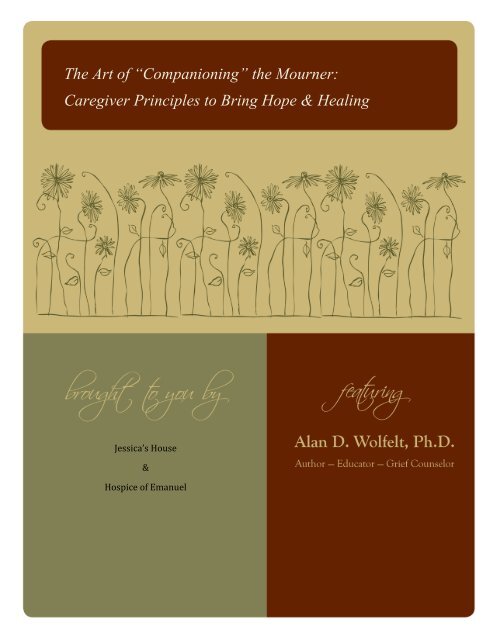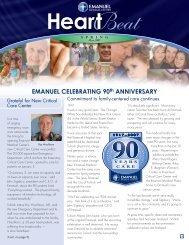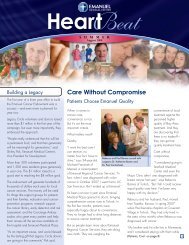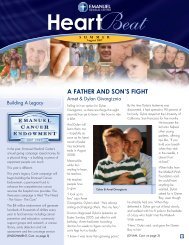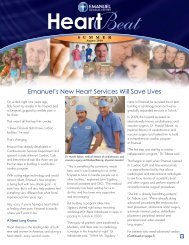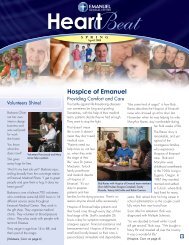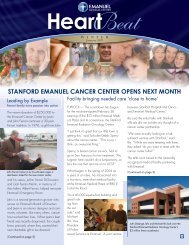to view handouts from the February - CA
to view handouts from the February - CA
to view handouts from the February - CA
Create successful ePaper yourself
Turn your PDF publications into a flip-book with our unique Google optimized e-Paper software.
The Art of “Companioning” <strong>the</strong> Mourner:<br />
Caregiver Principles <strong>to</strong> Bring Hope & Healing<br />
Jessica’s House<br />
&<br />
Hospice of Emanuel
Grief is not an<br />
As a teenager who had come <strong>to</strong> experience my own<br />
life losses, I set out <strong>to</strong> discover <strong>the</strong> principles that help<br />
bereaved people heal in grief. I hoped <strong>to</strong> communicate<br />
those principles <strong>to</strong> anyone interested in honoring my<br />
s<strong>to</strong>ry. To my dismay, I discovered that <strong>the</strong> majority of<br />
caregiving models for grief counselors were intertwined<br />
with <strong>the</strong> medical model of mental health care.<br />
For many caregivers, grief in contemporary society<br />
has been medicalized and perceived as if it were an<br />
illness that with proper assessment, diagnosis, and<br />
treatment can be cured. This paradigm dictates that<br />
we as caregivers, having studied and absorbed a body<br />
of knowledge and become experts, are responsible for<br />
“curing” our patients. How arrogant!<br />
The language we use <strong>to</strong> describe <strong>the</strong> practice of grief<br />
support exposes our attitudes and beliefs about<br />
counseling as well as determines our practices. Because<br />
numerous his<strong>to</strong>rical roots of psycho<strong>the</strong>rapy are deeply<br />
grounded in a medical model, because <strong>the</strong> medical<br />
model appears more scientific than o<strong>the</strong>r alternatives,<br />
and because <strong>the</strong> economics of practice are interfaced<br />
in a healthcare delivery system, <strong>the</strong> natural tendency<br />
has been <strong>to</strong> adopt medical model language.<br />
As I explored <strong>the</strong> words used in counseling <strong>the</strong><br />
bereaved, I was taken aback: symp<strong>to</strong>ms of pathology;<br />
disorders; diagnosis and treatments. In my own search<br />
<strong>to</strong> learn so I could teach, I found that <strong>the</strong>se more<br />
clinical, medical model approaches have limitations<br />
that are profound and far-reaching.<br />
I discovered that our modern understanding of grief<br />
all <strong>to</strong>o often projects that for “successful” mourning<br />
<strong>to</strong> take place, <strong>the</strong> person must “disengage <strong>from</strong> <strong>the</strong><br />
deceased” and by all means “let go.” We even have all<br />
sorts of books full of techniques on how <strong>to</strong> help o<strong>the</strong>rs<br />
“let go” or reach “closure.” At bot<strong>to</strong>m, I discovered<br />
that our current models desperately needed what we<br />
could refer <strong>to</strong> as a “supplement of <strong>the</strong> soul.” It seemed<br />
glaringly obvious <strong>to</strong> me that as fellow travelers in <strong>the</strong><br />
journey in<strong>to</strong> grief, we needed more life-giving, hopefilled<br />
models that incorporated not only <strong>the</strong> mind<br />
Grief is not an Illness<br />
Illness<br />
Alan D. Wolfelt, Ph.D., C.T., www.centerforloss.com<br />
and body, but <strong>the</strong> soul and <strong>the</strong> spirit! I found myself<br />
resonating more with <strong>the</strong> writings of people like Ram<br />
Das, Stephen Levine, Vic<strong>to</strong>r Frankl, James Hillman,<br />
Thomas Moore, and Carl Jung.<br />
Actually, it was Carl Jung’s writing that helped<br />
me understand that every psychological struggle is<br />
ultimately a matter of spirituality. In <strong>the</strong> end, as we<br />
as human beings mourn, we must discover meaning<br />
<strong>to</strong> go on living our <strong>to</strong>morrows without <strong>the</strong> physical<br />
presence of someone we have loved. Death and grief<br />
are spiritual journeys of <strong>the</strong> heart and soul.<br />
Yet our modern Western culture’s understanding<br />
of grief often urges mourners <strong>to</strong> deny any form of<br />
continued relationship with <strong>the</strong> person who died.<br />
For many mental health caregivers, <strong>the</strong> hallmark of<br />
so-called “pathology” has been rooted in terms of<br />
sustaining a relationship <strong>to</strong> <strong>the</strong> dead. In reality, <strong>the</strong><br />
mourner actively shifts <strong>the</strong> relationship <strong>from</strong> one of<br />
presence <strong>to</strong> one of memory. Or, as <strong>the</strong> playwright<br />
Robert Anderson wisely noted, “Death ends a life, it<br />
does not end a relationship.”<br />
Our modern understanding of grief all <strong>to</strong>o often<br />
conveys that <strong>the</strong> end result of bereavement is a
Inappropriate Assumptions Surrounding Our<br />
Modern Understanding of Grief and Loss<br />
series of completed tasks, extinguished pain, and <strong>the</strong><br />
establishment of new relationships. I discovered that<br />
many mental health caregivers, in attempting <strong>to</strong> make<br />
a science of grief, had compartmentalized complex<br />
emotions with neat clinical labels.<br />
Our modern understanding of grief all <strong>to</strong>o often uses<br />
a “recovery” or “resolution” definition <strong>to</strong> suggest a<br />
return <strong>to</strong> “normalcy.” Recovery, as unders<strong>to</strong>od by<br />
some mourners and caregivers alike, is erroneously<br />
seen as an absolute, a perfect state of reestablishment.<br />
We seem <strong>to</strong> want <strong>to</strong> go around any so-called “negative’<br />
moods and emotions quickly and efficiently. Yet it<br />
occurred <strong>to</strong> me that if our role as caregivers is <strong>to</strong> first<br />
observe <strong>the</strong> soul as it is, <strong>the</strong>n we need <strong>to</strong> abolish what<br />
I call <strong>the</strong> “resolution wish.”<br />
Our modern understanding of grief for some is based<br />
on <strong>the</strong> model of crisis <strong>the</strong>ory that purports that a<br />
person’s life is in a state of homeostatic balance,<br />
<strong>the</strong>n something comes along (like <strong>the</strong> death of<br />
someone loved) and knocks <strong>the</strong> person out of balance.<br />
Caregivers are taught intervention goals <strong>to</strong> reestablish<br />
<strong>the</strong> prior state of homeostasis and a return <strong>to</strong> “normal”<br />
functioning. There is only one major problem with this<br />
<strong>the</strong>ory: it doesn’t work. Why? Because a person’s life is<br />
changed forever by <strong>the</strong> death of someone loved. We are<br />
transformed by grief and do not return <strong>to</strong> prior states<br />
of “normal” based on interventions by outside forces.<br />
Our modern understanding of grief all <strong>to</strong>o often<br />
“pathologizes” normal experiences. Traditional<br />
psychology has focused <strong>the</strong> majority of attention on<br />
<strong>the</strong> diagnosis and treatment of pathologics and in <strong>the</strong><br />
quest for “fixes,” little attention has been paid <strong>to</strong> <strong>the</strong><br />
nature of emotional or spiritual health. As one author<br />
observed, “The exclusive focus on pathology that has<br />
dominated so much of our discipline results in a model<br />
of <strong>the</strong> human being lacking <strong>the</strong> positive features that<br />
make life worth living.”<br />
Our modern understanding of grief all <strong>to</strong>o often<br />
privatizes grief as an isolated, individual experience.<br />
Mourning, by nature of its definition—“a shared social<br />
response <strong>to</strong> loss”—must be <strong>view</strong>ed in <strong>the</strong> broader context<br />
Grief is not an Illness<br />
Alan D. Wolfelt, Ph.D., C.T., www.centerforloss.com<br />
of social and family perspectives. In fact, <strong>the</strong> person<br />
often perceived as “not doing well” in grief is usually <strong>the</strong><br />
one who is trying <strong>to</strong> get help <strong>from</strong> <strong>the</strong> family system. In<br />
sum, I discovered in my twelve years of university-based<br />
training and in reading <strong>the</strong> available literature on grief<br />
counseling that our modern understanding of grief all<br />
<strong>to</strong>o often lacks any appreciation for and attention <strong>to</strong><br />
<strong>the</strong> spiritual, soul-based nature of <strong>the</strong> grief journey.<br />
As authors such as Frankl, Fromm, and Jung noted<br />
years ago (and Hillmand and Moore more recently),<br />
academic psychology has been <strong>to</strong>o interfaced with <strong>the</strong><br />
natural sciences and labora<strong>to</strong>ry methods of working,<br />
counting, and objective reporting.<br />
Some of us, often through no fault of our own, but<br />
perhaps by <strong>the</strong> contamination of our formal training,<br />
have overlooked <strong>the</strong> journey in<strong>to</strong> grief as a soulbased<br />
journey. We need <strong>to</strong> think and reflect about<br />
grief care differently than we now do. Because while<br />
its mission in our society is certainly important, our<br />
misunderstanding of what its essence is misinforms<br />
our capacity <strong>to</strong> reflect on it wisely.<br />
Critical self-observation would suggest that perhaps<br />
we rely <strong>to</strong>o much on psychosocial, biological, and<br />
psychodynamic constructs that we have been taught<br />
<strong>to</strong> “treat away,” such as depression, anxiety, and loss<br />
of control. In our attempt <strong>to</strong> gain scientific credibility,<br />
we may have become our own worst enemies! In our<br />
attempt <strong>to</strong> be respected as part of established mental<br />
health care, we may be disrespecting <strong>the</strong> very people<br />
who need our compassionate care.<br />
Without doubt, <strong>the</strong> grief journey requires<br />
contemplation and turning inward. In o<strong>the</strong>r words,<br />
it requires depression, anxiety, and loss of control.<br />
It requires going <strong>to</strong> <strong>the</strong> wilderness. Quietness<br />
and emptiness invite <strong>the</strong> heart <strong>to</strong> observe signs of<br />
sacredness, <strong>to</strong> regain purpose, <strong>to</strong> rediscover love, <strong>to</strong><br />
renew life! Searching for meaning, reasons <strong>to</strong> get one’s<br />
feet out of bed, are not <strong>the</strong> domain of <strong>the</strong> medical<br />
model of bereavement care. Experience has taught me<br />
that it is <strong>the</strong> mysterious, spiritual dimension of grief<br />
that allows us <strong>to</strong> go on living until we, <strong>to</strong>o, die.
Foundations of “ ”<br />
One’s Fellow Human Beings<br />
I’ve always found it intriguing that <strong>the</strong> word “treat”<br />
comes form <strong>the</strong> Latin root word “tractare,” which<br />
means “<strong>to</strong> drag.” If we combine that with “patient,”<br />
we can really get in trouble. “Patient” means “passive<br />
long-term sufferer,” so if we treat patients, we drag<br />
passive, long-term sufferers. Simply stated, that’s not<br />
very empowering.<br />
On <strong>the</strong> o<strong>the</strong>r hand, <strong>the</strong> word “companioning,”<br />
when broken down in<strong>to</strong> its original Latin roots,<br />
means “messmate”: com for “with” and pan for<br />
“bread.” Someone you would share a meal with,<br />
a friend, an equal. I have taken liberties with <strong>the</strong><br />
noun “companion” and made it in<strong>to</strong> <strong>the</strong> verb<br />
“companioning” because it so well captures <strong>the</strong> type of<br />
counseling relationship I support and advocate. That is<br />
<strong>the</strong> image of companioning—sitting at a table <strong>to</strong>ge<strong>the</strong>r,<br />
being present <strong>to</strong> one ano<strong>the</strong>r, sharing, communing,<br />
abiding in <strong>the</strong> fellowship of hospitality.<br />
Companioning <strong>the</strong> bereaved is not about assessing,<br />
analyzing, fixing, or resolving ano<strong>the</strong>r’s grief. Instead,<br />
it is about being <strong>to</strong>tally present <strong>to</strong> <strong>the</strong> mourner, even<br />
being a temporary guardian of her soul.<br />
The companioning model is anchored in <strong>the</strong> “teach<br />
me” perspective. It is about learning and observing. In<br />
fact, <strong>the</strong> meaning of “observance” comes <strong>to</strong> us <strong>from</strong><br />
ritual. It means not only <strong>to</strong> “watch out for” but also<br />
“<strong>to</strong> keep and honor,” “<strong>to</strong> bear witness.” The caregiver’s<br />
awareness of this need <strong>to</strong> learn is <strong>the</strong> essence of true<br />
companioning.<br />
If your desire is <strong>to</strong> support a fellow human in grief,<br />
you must create a “safe place” for people <strong>to</strong> embrace<br />
<strong>the</strong>ir feelings of profound loss. This safe place is a<br />
cleaned-out, compassionate heart. It is <strong>the</strong> open heart<br />
that allows you <strong>to</strong> be truly present <strong>to</strong> ano<strong>the</strong>r human<br />
being’s intimate pain.<br />
Companioning<br />
Foundations of “Companioning” One’s Fellow Human Beings<br />
Alan D. Wolfelt, Ph.D., C.T., www.centerforloss.com<br />
As a bereavement caregiver, I am a companion, not<br />
a “guide”—which assumes a knowledge of ano<strong>the</strong>r’s<br />
soul I cannot claim. To companion our fellow humans<br />
means <strong>to</strong> watch and learn. Our awareness of <strong>the</strong> need<br />
<strong>to</strong> learn (as opposed <strong>to</strong> our tendency <strong>to</strong> play <strong>the</strong> expert)<br />
is <strong>the</strong> essence of true companioning.<br />
A central role of <strong>the</strong> companion <strong>to</strong> a mourner is related<br />
<strong>to</strong> <strong>the</strong> art of honoring s<strong>to</strong>ries. Honoring s<strong>to</strong>ries requires<br />
that we slow down, turn inward, and really listen as<br />
people acknowledge <strong>the</strong> reality of loss, embrace pain,<br />
re<strong>view</strong> memories, and search for meaning.<br />
The philosophy and practice of companioning<br />
interfaces naturally with hospitality. Hospitality is <strong>the</strong><br />
essence of knowing how <strong>to</strong> live in society. Among <strong>the</strong><br />
ancient Greeks, hospitality was a necessary element of<br />
day-<strong>to</strong>-day life. In a land where borders were permeable,<br />
it was important <strong>to</strong> get <strong>to</strong> know one’s neighbors as<br />
potential friends. One way <strong>to</strong> do this was <strong>to</strong> share<br />
meals <strong>to</strong>ge<strong>the</strong>r. First, <strong>the</strong> guest and host would pour a<br />
libation <strong>to</strong> <strong>the</strong> gods. Then, after <strong>the</strong> guest was full, <strong>the</strong>y<br />
would tell each o<strong>the</strong>r <strong>the</strong>ir s<strong>to</strong>ries with <strong>the</strong> guest going<br />
first. Often, tears were shed as <strong>the</strong>ir s<strong>to</strong>ries were highly<br />
personal: battles, family, his<strong>to</strong>ries, and life tragedies all<br />
were a part of <strong>the</strong>se s<strong>to</strong>ries. After <strong>the</strong> evening <strong>to</strong>ge<strong>the</strong>r,<br />
A central role of <strong>the</strong><br />
companion <strong>to</strong> a mourner<br />
is related <strong>to</strong> <strong>the</strong> art of<br />
honoring s<strong>to</strong>ries.
<strong>the</strong> host and guest were potential allies. Still <strong>to</strong>day,<br />
oftentimes “breaking bread <strong>to</strong>ge<strong>the</strong>r” and <strong>the</strong>n “telling<br />
personal s<strong>to</strong>ries” are key elements of companioning<br />
people in grief.<br />
Henri Nouwen once elegantly described hospitality as<br />
<strong>the</strong> “creation of a free space where <strong>the</strong> stranger can<br />
enter and become a friend instead of an enemy.” He<br />
observed that hospitality is not about trying <strong>to</strong> change<br />
people, but offering <strong>the</strong>m space where change can take<br />
place. He astutely noted that “hospitality is not a subtle<br />
invitation <strong>to</strong> adopt <strong>the</strong> lifestyle of <strong>the</strong> host, but <strong>the</strong> gift<br />
of a chance for <strong>the</strong> guest <strong>to</strong> find his own.”<br />
Also interesting <strong>to</strong> note is that <strong>the</strong> Oxford English<br />
Dictionary defines “companion” as “<strong>to</strong> accompany,<br />
<strong>to</strong> associate, <strong>to</strong> comfort, <strong>to</strong> be familiar with.” This<br />
definition is actually illustrative of what it means <strong>to</strong><br />
companion. In one sense, <strong>the</strong> notion is of comforting<br />
someone, which relates clearly <strong>to</strong> what a mourner<br />
needs and deserves. In ano<strong>the</strong>r sense, <strong>the</strong> notion is of<br />
knowing someone, being familiar with that person’s<br />
experiences and needs; this notion clearly relates <strong>to</strong><br />
<strong>the</strong> process of becoming familiar (being open <strong>to</strong> being<br />
taught by one ano<strong>the</strong>r), which can take place through<br />
<strong>the</strong> “telling of <strong>the</strong> s<strong>to</strong>ry.”<br />
In sum, companioning is <strong>the</strong> art of bringing comfort<br />
<strong>to</strong> ano<strong>the</strong>r by becoming familiar with her s<strong>to</strong>ry<br />
(experiences and needs). To companion <strong>the</strong> grieving<br />
person, <strong>the</strong>refore, is <strong>to</strong> break bread literally or<br />
figuratively, as well as listen <strong>to</strong> <strong>the</strong> s<strong>to</strong>ry of <strong>the</strong> o<strong>the</strong>r.<br />
Of course this may well involve tears and sorrow and<br />
tends <strong>to</strong> involve a give and take of s<strong>to</strong>ry: I tell you my<br />
s<strong>to</strong>ry and you tell me yours. It is a sharing in a deep<br />
and profound way.<br />
Foundations of “Companioning” One’s Fellow Human Beings<br />
The sad reality is that being a fellow companion in<br />
contemporary times seems <strong>to</strong> be a lost art. Many people<br />
(including trained mental health caregivers) may not<br />
know how <strong>to</strong> truly listen, really hear, and realize how<br />
<strong>to</strong> honor ano<strong>the</strong>r person’s s<strong>to</strong>ry. I often say, “It’s not<br />
so much what is new in grief care; it is what we lost<br />
that we once had.” One interesting study found that<br />
71 percent of North Americans don’t even know <strong>the</strong>ir<br />
neighbors, let alone have <strong>the</strong> desire <strong>to</strong> honor s<strong>to</strong>ries<br />
with <strong>the</strong>m.<br />
Advocating for <strong>the</strong><br />
“Companioning”<br />
Model of Grief Care<br />
A not-so-secret hope of mine is that <strong>the</strong> philosophical<br />
model of companioning explored in my book,<br />
Companioning <strong>the</strong> Bereaved, will eventually replace <strong>the</strong><br />
more traditional medical model, which teaches that<br />
grief’s goal is movement <strong>from</strong> illness <strong>to</strong> normalcy. The<br />
companioning philosophy empathizes with <strong>the</strong> human<br />
need <strong>to</strong> mourn au<strong>the</strong>ntically without an sense of<br />
shame. The companioning model encourages everyone<br />
of us <strong>to</strong> discover how loss has forever changed us. The<br />
companioning model understands <strong>the</strong> normalcy of<br />
drowning in your grief before you tread water, and that<br />
only after treading water do you go on <strong>to</strong> swim. The<br />
companioning model helps <strong>the</strong> caregiver acknowledge<br />
<strong>the</strong> responsibility for creating conditions that allow <strong>the</strong><br />
grieving person <strong>to</strong> embrace <strong>the</strong> wilderness of grief.
Bearing witness <strong>to</strong> <strong>the</strong> struggles of someone experiencing<br />
<strong>the</strong> darkness of grief—having empathy—is <strong>the</strong> deepest<br />
form of emotional and spiritual interaction you can<br />
have with ano<strong>the</strong>r human being. If you can hear ano<strong>the</strong>r<br />
person’s words of pain and loss, not <strong>from</strong> a place of<br />
clinical distance but <strong>from</strong> a place of an open heart,<br />
<strong>the</strong>n you can bring a fully alive human presence <strong>to</strong> bear<br />
on <strong>the</strong> o<strong>the</strong>r human being’s experiences. Overcoming<br />
any tendency <strong>to</strong> judge will allow you <strong>to</strong> be taught by<br />
<strong>the</strong> griever. This active empathy will naturally create an<br />
environment in which healing can and will occur.<br />
Entering in<strong>to</strong> and bearing witness <strong>to</strong> <strong>the</strong> anguish of<br />
raw grief can be overwhelming, for <strong>to</strong> actually be able<br />
<strong>to</strong> enter in<strong>to</strong> ano<strong>the</strong>r person’s experience so completely<br />
that she is able <strong>to</strong> feel your companionship is <strong>the</strong><br />
embodiment of <strong>the</strong> highest degree of emotional and<br />
spiritual refinement. To truly join <strong>the</strong> mourner in <strong>the</strong><br />
place of her helplessness requires that we as caregivers<br />
visit our own grief and experience our transformed<br />
hearts.<br />
Doing Your Own Work First<br />
The supporting cradle of empathy evolves <strong>from</strong> <strong>the</strong><br />
collage of feelings we have come <strong>to</strong> encounter in our<br />
own personal journeys in<strong>to</strong> grief. You may find that<br />
if you haven’t felt a particular feeling, or if you are<br />
unwilling or unable <strong>to</strong> reencounter it, your capacity <strong>to</strong><br />
be present <strong>to</strong> ano<strong>the</strong>r person will be inhibited. You may<br />
even see <strong>the</strong> loss as something that has happened <strong>to</strong><br />
“her” and not <strong>to</strong> “you” and thus lose your openness,<br />
your compassionate presence. Your empathy with her<br />
struggles will be a feeble attempt at embracing <strong>the</strong><br />
feelings, not a truly empa<strong>the</strong>tic experience.<br />
That is why bearing witness <strong>to</strong> <strong>the</strong> struggle of those<br />
in grief is such a demanding ministry. You have <strong>to</strong> do<br />
your own work first <strong>to</strong> acquaint yourself in depth with<br />
your soul-based emotions. Only <strong>the</strong>n, because you have<br />
au<strong>the</strong>ntically felt, will you “know what it feels like.” You<br />
will have an anchor in your own soul for what a grief<br />
BearingW i tn e ss<br />
Bearing Witness<br />
Alan D. Wolfelt, Ph.D., C.T., www.centerforloss.com<br />
experience may feel like <strong>to</strong> a fellow human being. Since<br />
you have been <strong>the</strong>re, you can enter in<strong>to</strong> struggles such<br />
as discovering a reason <strong>to</strong> go on living, redefining one’s<br />
world<strong>view</strong>, and searching for meaning in life and living.<br />
A natural inhibition in <strong>the</strong> willingness <strong>to</strong> enter in<strong>to</strong><br />
<strong>the</strong> wilderness of grief is that we are often hesitant, or<br />
literally afraid, of reopening our own wounds. Instead<br />
of being able <strong>to</strong> companion a fellow struggler, we may<br />
be overwhelmed by <strong>the</strong> conscious recreation of our<br />
own painful feelings. So, instead of being open <strong>to</strong> <strong>the</strong><br />
presence of <strong>the</strong> pain of <strong>the</strong> loss, we may deny people <strong>the</strong>ir<br />
experiences (“It could be worse”); we may problem-solve<br />
To truly join <strong>the</strong> mourner in <strong>the</strong> place<br />
of her helplessness requires that we<br />
as caregivers visit our own grief and<br />
experience our transformed hearts.<br />
or technique people (“Here’s what <strong>to</strong> do so you can let<br />
go”); or we may minimize or compare experiences (“You<br />
think you have it bad? Let me tell you what happened<br />
<strong>to</strong> someone else”).<br />
To be able <strong>to</strong> enter in<strong>to</strong> <strong>the</strong> wilderness with a person in<br />
<strong>the</strong> depths of grief, <strong>the</strong>refore, requires <strong>the</strong> embracing<br />
of our own heartfelt emotions, not in <strong>the</strong> sense of<br />
mastering <strong>the</strong>m, but in allowing <strong>the</strong>m <strong>to</strong> flow through<br />
us. Then, and only <strong>the</strong>n, are we able <strong>to</strong> give <strong>the</strong> most<br />
precious gift—our compassionate companionship.<br />
Expressing Compassion<br />
Bearing witness <strong>to</strong> <strong>the</strong> struggles of people in grief is about<br />
having compassion. Compassion is <strong>from</strong> <strong>the</strong> words cum<br />
pation, meaning “<strong>to</strong> suffer with,” “<strong>to</strong> undergo with,”<br />
“<strong>to</strong> share solidarity with.” Compassion embraces our<br />
common humanity, our feelings of <strong>to</strong>ge<strong>the</strong>rness, and<br />
our experiences of kinship. This word compassion has
een so much in exile in <strong>the</strong> mainstream grief counseling<br />
literature, yet it is <strong>the</strong> very essence of what bereaved people<br />
both need and deserve. While empathy refers <strong>to</strong> “feeling<br />
with” <strong>the</strong> grieving person, compassion is about “feeling for”<br />
<strong>the</strong> grieving person. You have <strong>to</strong> care for and about <strong>the</strong> person<br />
<strong>to</strong> be a soulful companion.<br />
Actively expressing compassion through bearing witness <strong>to</strong><br />
<strong>the</strong> struggles of o<strong>the</strong>rs is by no means elitist. Anyone and<br />
everyone can express compassion <strong>to</strong> someone encountering<br />
grief. You don’t have <strong>to</strong> have a college degree <strong>to</strong> express<br />
compassion. You don’t have <strong>to</strong> be a certified grief counselor<br />
<strong>to</strong> express compassion. You only need <strong>to</strong> have a heart full of<br />
grace and a soul anchored in love.<br />
Bearing Witness Means Being<br />
Involved in <strong>the</strong> Feeling World<br />
Bearing witness <strong>to</strong> <strong>the</strong> struggle of <strong>the</strong> griever is anchored<br />
in striving <strong>to</strong> understand <strong>the</strong> meaning of her experience<br />
<strong>from</strong> <strong>the</strong> inside out ra<strong>the</strong>r than imposing meaning on <strong>the</strong><br />
experience <strong>from</strong> <strong>the</strong> outside in. Active empathy means <strong>the</strong><br />
caregiver is attentively involved in a process of exploration.<br />
The companion is trying <strong>to</strong> grasp what it is like inside <strong>the</strong><br />
soul—<strong>the</strong> life force—of <strong>the</strong> griever.<br />
Empa<strong>the</strong>tic responsiveness requires <strong>the</strong> ability <strong>to</strong> go beyond<br />
<strong>the</strong> surface and <strong>to</strong> become involved in <strong>the</strong> mourner’s feeling<br />
world, but always with an “as if” quality of taking ano<strong>the</strong>r’s<br />
role without personally experiencing what <strong>the</strong> o<strong>the</strong>r person<br />
experiences. What is <strong>the</strong> inner flavor and what are <strong>the</strong> unique<br />
meanings that person’s experience has for him or her? What<br />
is it that she is trying <strong>to</strong> express but can’t quite say in words?<br />
This empa<strong>the</strong>tic, “bearing witness” process is in contrast<br />
<strong>to</strong> both sympathy and identification. Sympathy is a feeling<br />
of concern for someone else without necessarily becoming<br />
involved in a close, helping relationship; it projects an “I feel<br />
sorry for you” attitude, but s<strong>to</strong>ps short of empathy. More<br />
destructive than sympathy is identification. This attitude is<br />
conveyed by those who submerge <strong>the</strong>mselves with <strong>the</strong> griever<br />
and try <strong>to</strong> take on <strong>the</strong>ir feelings for <strong>the</strong>m. These are people<br />
who make assumptions like, “I know just how you feel.” The<br />
last person <strong>the</strong> griever feels safe with are those who convey<br />
this attitude of over-identification.<br />
Bearing Witness
Bearing Witness Means Going<br />
Beyond “I Know How You Feel”<br />
Bearing witness <strong>from</strong> a place of active empathy is<br />
experienced when <strong>the</strong> mourner feels you understand. To<br />
simply say, “I understand how you feel” is not enough.<br />
Empathy is communicated when you, <strong>the</strong> companion,<br />
respond at <strong>the</strong> emotional, feeling level of <strong>the</strong> mourner.<br />
You reach <strong>the</strong> mourner where he is, being careful not<br />
<strong>to</strong> bring judgment or a need <strong>to</strong> get him <strong>to</strong> “let go” and<br />
“move on.” This dependable quality of empathy is what<br />
seems <strong>to</strong> free <strong>the</strong> mourner <strong>to</strong> open his heart and mourn<br />
<strong>from</strong> <strong>the</strong> inside out.<br />
Bearing Witness Means Not Trying <strong>to</strong> “Fix<br />
Things”<br />
The more you encourage <strong>the</strong> mourner <strong>to</strong> teach you<br />
<strong>from</strong> a position of concerned curiosity, <strong>the</strong> less you will<br />
feel any need <strong>to</strong> “fix things.” As you allow yourself <strong>to</strong><br />
be taught, you are relieved of any burden <strong>to</strong> get people<br />
where you would like <strong>the</strong>m <strong>to</strong> go. In o<strong>the</strong>r words, you<br />
are not attached <strong>to</strong> <strong>the</strong> outcome.<br />
The paradoxical aspect of this attitude is that <strong>the</strong> more<br />
you allow yourself <strong>to</strong> be taught and follow <strong>the</strong> mourner’s<br />
lead, <strong>the</strong> more integration of <strong>the</strong> loss seems <strong>to</strong> take<br />
place. At least this is a very real part of my experience<br />
and probably one of <strong>the</strong> greatest gifts I have discovered<br />
in my life’s work.<br />
Bearing Witness Means<br />
Embracing Feelings of Loss<br />
Observation suggests that some people who attempt<br />
<strong>to</strong> help grieving people hesitate <strong>to</strong> elicit and embrace<br />
feelings such as sadness, loneliness, anxiety, and hurt,<br />
often fearing that <strong>the</strong> expression of <strong>the</strong>se feelings at<br />
least “won’t do any good,” or, at most, will “make<br />
matters worse.” However, experience suggests that such<br />
hesitation is a form of defensive protection for <strong>the</strong><br />
caregiver who finds it threatening <strong>to</strong> respond at any true<br />
emotional-spiritual level <strong>to</strong> <strong>the</strong> mourner.<br />
Just because feelings are threatening does not mean<br />
that we as companions should avoid encouraging <strong>the</strong>ir<br />
expression in <strong>the</strong> mourner. We should never avoid what<br />
a mourner feels because we fear she cannot take it. She is<br />
always taking it. The question is whe<strong>the</strong>r you will support<br />
her in experiencing it with your compassionate presence<br />
or only in <strong>the</strong> isolation of being alone with it. We could<br />
also reframe this <strong>to</strong> note: We as caregivers should never<br />
avoid what a mourner implicitly feels because we fear we<br />
cannot take it!<br />
Bearing Witness<br />
Benefits of Bearing Witness<br />
Without Bearing Judgment<br />
The capacity <strong>to</strong> convey active empathy while bearing<br />
witness has a number of benefits for <strong>the</strong> mourner<br />
Among <strong>the</strong>m are <strong>the</strong> following:<br />
• Empa<strong>the</strong>tic communication is a foundation<br />
upon which you establish a companion-witness<br />
relationship with <strong>the</strong> mourner.<br />
• The mourner who feels empa<strong>the</strong>tically unders<strong>to</strong>od<br />
and not judged is more likely <strong>to</strong> risk sharing deep,<br />
soul-based encounters with grief.<br />
• The mourner’s experience of your genuine effort<br />
and commitment <strong>to</strong> understand creates a trusting,<br />
low-threat environment that negates <strong>the</strong> need for<br />
self-protection and isolation.<br />
• The communication of empathy encourages selfexploration<br />
in <strong>the</strong> mourner, a prerequisite for<br />
compassionate self-understanding and, eventually,<br />
movement (with “no rewards for speed”) <strong>to</strong>ward<br />
reconciliation.<br />
Our choices about attitude related <strong>to</strong> how <strong>to</strong> support<br />
our fellow human beings in grief often seem <strong>to</strong> relate<br />
<strong>to</strong> motives and needs. Adopting a bearing-witness-<strong>to</strong>-<strong>the</strong>struggles<br />
attitude of “teach me about your grief and I<br />
will be with you without judgment” means we give up<br />
<strong>the</strong> status that sometimes falsely comes <strong>from</strong> being a<br />
professional “expert.” However, I suspect that in giving<br />
up or letting go of some of this ego-based identity, we<br />
may well discover our natural compassion.
One<br />
Two<br />
Three<br />
Four<br />
Five<br />
Six<br />
Seven<br />
Eight<br />
Nine<br />
Ten<br />
Eleven<br />
Companioning<br />
Eleven Tenets of Companioning <strong>the</strong> Bereaved<br />
Tenet One: Companioning is about being present <strong>to</strong> ano<strong>the</strong>r person’s pain;<br />
it is not about taking away <strong>the</strong> pain.<br />
Tenet Two: Companioning is about going <strong>to</strong> <strong>the</strong> wilderness of <strong>the</strong> soul with<br />
ano<strong>the</strong>r human being; it is not about thinking you are responsible for<br />
finding <strong>the</strong> way out.<br />
Tenet Three: Companioning is about honoring <strong>the</strong> spirit; it is not about<br />
focusing on <strong>the</strong> intellect.<br />
Tenet Four: Companioning is about listening with <strong>the</strong> heart; it is not about<br />
analyzing with <strong>the</strong> head.<br />
Tenet Five: Companioning is about bearing witness <strong>to</strong> <strong>the</strong> struggles of o<strong>the</strong>rs;<br />
it is not about judging or directing <strong>the</strong>se struggles.<br />
Tenet Six: Companioning is about walking alongside; it is not about leading<br />
or being led.<br />
Tenet Seven: Companioning is about discovering <strong>the</strong> gifts of sacred silence;<br />
it does not mean filling up every moment with words.<br />
Tenet Eight: Companioning is about being still; it is not about frantic<br />
movement forward.<br />
Tenet Nine: Companioning is about respecting disorder and confusion;<br />
it is not about imposing order and logic.<br />
Tenet Ten: Companioning is about learning <strong>from</strong> o<strong>the</strong>rs; it is not about<br />
teaching <strong>the</strong>m.<br />
Tenet Eleven: Companioning is about compassionate curiosity;<br />
it is not about expertise.<br />
Alan D. Wolfelt, Ph.D., C.T., www.centerforloss.com<br />
More details related <strong>to</strong> each tenet listed above is printed in “The Handbook for Companioning <strong>the</strong> Mourner: Eleven Essential Principles” by Dr. Alan D. Wolfelt P.h.D.<br />
This book can be purchased online at www.centerforloss.com or by calling <strong>the</strong> Center for Loss and Life Transition at 970-226-6050.
TheAwesome Power of “Telling <strong>the</strong> S<strong>to</strong>ry”<br />
As my fa<strong>the</strong>r lay in his hospital bed recovering <strong>from</strong><br />
cancer surgery recently, it was my privilege <strong>to</strong> honor his<br />
life s<strong>to</strong>ry. My wonderful fa<strong>the</strong>r recognized in his head<br />
and heart that his days on earth were limited. Rest did<br />
not come easy, but his need <strong>to</strong> “s<strong>to</strong>ry” did.<br />
His love of family flowed out of s<strong>to</strong>ries <strong>from</strong> his<br />
childhood. He <strong>to</strong>ld me how his mo<strong>the</strong>r inspired his love<br />
for baseball. He <strong>to</strong>ld me how his fa<strong>the</strong>r was not very<br />
emotionally or physically available <strong>to</strong> him as he grew<br />
<strong>from</strong> childhood <strong>to</strong> adolescence. He <strong>to</strong>ld me of his deep<br />
love for his older bro<strong>the</strong>rs and sisters.<br />
In <strong>the</strong> midst of my awareness that I would soon not have<br />
my fa<strong>the</strong>r in my life, I listened and I learned. I affirmed<br />
that his love for me was true and abiding. I learned of his<br />
fears about my mo<strong>the</strong>r, who will survive him. I learned<br />
what I already knew—my fa<strong>the</strong>r is a great man, a loving<br />
husband, and a wonderful fa<strong>the</strong>r.<br />
I also learned about <strong>the</strong> awesome power of “telling <strong>the</strong><br />
s<strong>to</strong>ry.” As he shifted <strong>from</strong> <strong>to</strong>pic <strong>to</strong> <strong>to</strong>pic, he did not need<br />
me <strong>to</strong> get in <strong>the</strong> way. As he occasionally struggled with a<br />
detail of a long-ago memory, he did not need me <strong>to</strong> get<br />
in <strong>the</strong> way. As he was brought <strong>to</strong> tears by his love-filled<br />
memories of life and living, he did not need me <strong>to</strong> get<br />
in <strong>the</strong> way.<br />
I write <strong>the</strong>se words on an airplane as I leave him for what<br />
may be one of <strong>the</strong> last times. As I reflect on my all-night<br />
vigil of honoring his s<strong>to</strong>ry, I am once again humbled<br />
by <strong>the</strong> remarkable importance of how “s<strong>to</strong>rying” brings<br />
meaning and purpose <strong>to</strong> our life and death experiences.<br />
Like you, I work with <strong>the</strong> bereaved and commit much of<br />
my life’s vocation <strong>to</strong> honoring s<strong>to</strong>ries—s<strong>to</strong>ries of love and<br />
loss, pain and joy, hopes fulfilled and dreams lost.<br />
My heightened awareness of s<strong>to</strong>ries’ power occurred<br />
at a moment of need. Recently, I conducted a series<br />
of media inter<strong>view</strong>s ranging <strong>from</strong> daily newspapers <strong>to</strong><br />
TIME magazine. Surprisingly, I was put in <strong>the</strong> position<br />
of defending my chosen profession. Following <strong>the</strong> highly<br />
publicized Columbine High School tragedy, <strong>the</strong> media<br />
Why we should be proud of our work with <strong>the</strong> bereaved<br />
The Awesome Power of “Telling <strong>the</strong> S<strong>to</strong>ry”<br />
Alan D. Wolfelt, Ph.D., C.T., www.centerforloss.com<br />
This article was first published spring 2000<br />
had many leads <strong>to</strong> pursue. When <strong>the</strong> flawed analysis of<br />
<strong>the</strong> causes, <strong>the</strong> emotional inter<strong>view</strong>s with those most<br />
impacted, and <strong>the</strong> coverage of <strong>the</strong> funerals was over,<br />
however, <strong>the</strong> media felt <strong>the</strong> urge <strong>to</strong> find more s<strong>to</strong>ry lines.<br />
After all, anything connected <strong>to</strong> Columbine seemed <strong>to</strong><br />
capture readers.<br />
Therefore, in <strong>the</strong> frenzy <strong>to</strong> search out and create more<br />
s<strong>to</strong>ries, <strong>the</strong>y found me—a grief counselor, a person who<br />
founded <strong>the</strong> Center for Loss and Life Transition years<br />
ago in an effort <strong>to</strong> help people devastated by loss, and a<br />
person who loves <strong>to</strong> educate and train o<strong>the</strong>rs about <strong>the</strong><br />
importance and value of companioning each o<strong>the</strong>r in<br />
times of grief.<br />
While talking <strong>to</strong> <strong>the</strong> media, it did not take me long<br />
<strong>to</strong> understand that <strong>the</strong> s<strong>to</strong>ries would not be friendly<br />
because of <strong>the</strong> nature of <strong>the</strong> questions: “Don’t you think<br />
<strong>the</strong>se kids would be better off just putting this tragedy<br />
behind <strong>the</strong>m?” “Why do all <strong>the</strong>se grief counselors think<br />
<strong>the</strong>y have <strong>to</strong> rush <strong>to</strong> <strong>the</strong> scene?” “ What is <strong>the</strong> value of<br />
what you do?” “Aren’t you just listening and getting paid<br />
for it?”<br />
Reaffirming Our Value<br />
Thanks <strong>to</strong> my loving fa<strong>the</strong>r and his need <strong>to</strong> tell <strong>the</strong> s<strong>to</strong>ry,<br />
I have given more thought <strong>to</strong> <strong>the</strong> many reasons why we<br />
should be proud of <strong>the</strong> work we do with <strong>the</strong> bereaved.<br />
The many benefits of honoring <strong>the</strong> s<strong>to</strong>ries of our fellow<br />
human beings include:<br />
• We can search for wholeness among our fractured<br />
parts.<br />
• We can come <strong>to</strong> know who we are in new and<br />
unexpected ways.<br />
• We can explore our past and come <strong>to</strong> a more<br />
profound understanding of our origins and our<br />
future directions.<br />
• We can tentatively explain our <strong>view</strong> of <strong>the</strong> world<br />
and come <strong>to</strong> understand who we are.<br />
• We can explore how love experienced and love lost<br />
have influenced our time on earth.
• We can discover how a life without “s<strong>to</strong>ry” is like<br />
a book without pages—nice <strong>to</strong> see but lacking in<br />
substance.<br />
• We can seek forgiveness and be humbled by our<br />
own mortality.<br />
• We can determine how adversity has enriched our<br />
meaning and purpose of life.<br />
• We can journey inward and discover connections<br />
previously not unders<strong>to</strong>od or acknowledged.<br />
• We can create an awareness of how <strong>the</strong> past<br />
interfaces with <strong>the</strong> present, and how <strong>the</strong> present<br />
ebbs back in<strong>to</strong> <strong>the</strong> past.<br />
• We can discover that <strong>the</strong> route <strong>to</strong> healing lies<br />
not only in <strong>the</strong> physical realm, but also in <strong>the</strong><br />
emotional and spiritual realms.<br />
• We can find that <strong>the</strong> fulfillment of a life well lived<br />
is bes<strong>to</strong>wed through <strong>the</strong> translation of our past in<strong>to</strong><br />
experiences that are expressed through <strong>the</strong> oral or<br />
written word.<br />
• We can come <strong>to</strong> understand that in our pain and<br />
suffering lies <strong>the</strong> awareness of <strong>the</strong> preciousness of<br />
each day on earth.<br />
• We can discover our truth in this present moment<br />
of time and space.<br />
In part, we heal ourselves as we tell <strong>the</strong> tale. This is <strong>the</strong><br />
awesome power of <strong>the</strong> s<strong>to</strong>ry.<br />
Yet, in our fast-paced, efficiency-based culture, which<br />
lacks an understanding of <strong>the</strong> role of hurt in healing,<br />
many people do not understand <strong>the</strong> value of telling<br />
<strong>the</strong> s<strong>to</strong>ry. Honoring s<strong>to</strong>ries requires that we slow down,<br />
turn inward, and embrace our pain and that of o<strong>the</strong>rs.<br />
Listening <strong>to</strong> s<strong>to</strong>ries filled with sadness and grief is<br />
in<strong>to</strong>lerable in a culture that collectively avoids <strong>the</strong>se<br />
emotions whenever possible.<br />
Thus, a number of media-types recently tried <strong>to</strong> suggest<br />
that grief counselors, aftercare givers and o<strong>the</strong>rs who<br />
focus on helping families through times of loss are<br />
unnecessary, perhaps even damaging. They might have<br />
The Awesome Power of “Telling <strong>the</strong> S<strong>to</strong>ry”<br />
you believe that those most impacted by <strong>the</strong> Columbine<br />
tragedy would be better off it <strong>the</strong>y “bucked up,” carried<br />
on, and “Kept <strong>the</strong>ir chin up.” One of my inter<strong>view</strong>ers<br />
even asked, “Don’t you think traumatic pain like this<br />
is better off denied?” In an effort <strong>to</strong> create a s<strong>to</strong>ry, <strong>the</strong><br />
media tried <strong>to</strong> become “s<strong>to</strong>ry-killers.”<br />
The need <strong>to</strong> tell <strong>the</strong> s<strong>to</strong>ry and have it heard prevails,<br />
however, as does <strong>the</strong> need <strong>to</strong> have safe places <strong>to</strong><br />
acknowledge <strong>the</strong> reality of <strong>the</strong> loss, embrace <strong>the</strong> pain,<br />
secure memories, search for meaning, and receive<br />
ongoing support. This need is more powerful than <strong>the</strong><br />
media, which is contaminated by a culture that has lost<br />
its sense of community.<br />
I hope you feel as proud as I do <strong>to</strong> work with bereaved<br />
families. Though some may question <strong>the</strong> need for what<br />
you and I do <strong>to</strong> help people in grief, I suggest we stand<br />
tall and proud. It is primarily through having places <strong>to</strong><br />
“s<strong>to</strong>ry” that people have <strong>the</strong> opportunity <strong>to</strong> try <strong>to</strong> make<br />
sense of <strong>the</strong> senseless, <strong>to</strong> embrace what needs <strong>to</strong> be<br />
embraced, and <strong>to</strong> reveal that <strong>the</strong> human spirit prevails.<br />
A Sacred Moment<br />
Honoring my fa<strong>the</strong>r’s s<strong>to</strong>ry also blessed me with a sacred<br />
moment. As I helped him prepare <strong>to</strong> leave <strong>the</strong> hospital,<br />
he gave me a “high five,” and with a glint in his eye said,<br />
“Thanks for listening. Thanks for helping me make a<br />
plan <strong>to</strong> go home.” The awesome power of <strong>the</strong> s<strong>to</strong>ry.<br />
Thanks, Dad, for reminding me not only of your love for<br />
me and our family, but of how all of us need <strong>to</strong> s<strong>to</strong>p—<br />
<strong>to</strong> listen—and <strong>to</strong> honor s<strong>to</strong>ries about life and death.<br />
Thanks for making me proud <strong>to</strong> be a grief counselor<br />
and companion <strong>to</strong> my fellow human beings but, most of<br />
all, thanks for making me proud <strong>to</strong> be your son.
SeekReconciliation, NOT Resolution<br />
How do you ever find your way out of <strong>the</strong> wilderness of<br />
your grief? You don’t have time <strong>to</strong> dwell <strong>the</strong>re forever,<br />
do you? The good news is that no, you don’t have <strong>to</strong><br />
dwell <strong>the</strong>re forever. If you follow <strong>the</strong> trail markers on<br />
your journey through <strong>the</strong> wilderness, you will find your<br />
way out. But just as with any significant experience in<br />
your life, <strong>the</strong> wilderness will always live inside of you and<br />
be a part of who you are.<br />
A number of psychological models describing grief<br />
refer <strong>to</strong> “resolution,” “recovery,” “reestablishment,” or<br />
“reorganization” as being <strong>the</strong> destination of your grief<br />
journey. You may have heard—indeed you may believe—<br />
that your grief journey’s end will come when you resolve,<br />
or recover <strong>from</strong>, your grief.<br />
But you may also be coming <strong>to</strong> understand one of <strong>the</strong><br />
fundamental truths of grief: Your journey will never<br />
truly end. People do not “get over” grief. My personal<br />
and professional experience tells me that a <strong>to</strong>tal return<br />
<strong>to</strong> “normalcy” after <strong>the</strong> death of someone loved is not<br />
possible; we are all forever changed by <strong>the</strong> experience<br />
of grief.<br />
Reconciliation is a term I find more appropriate for<br />
what occurs as you work <strong>to</strong> integrate <strong>the</strong> new reality of<br />
moving forward in life without <strong>the</strong> physical presence<br />
of <strong>the</strong> person who died. With reconciliation comes a<br />
renewed sense of energy and confidence, an ability <strong>to</strong><br />
fully acknowledge <strong>the</strong> reality of <strong>the</strong> death and a capacity<br />
<strong>to</strong> become re-involved in <strong>the</strong> activities of <strong>the</strong> living.<br />
There is also an acknowledgement that pain and grief<br />
are difficult, yet necessary, parts of life.<br />
As <strong>the</strong> experience of reconciliation unfolds, you will<br />
recognize that life is, and will continue <strong>to</strong> be, different<br />
without <strong>the</strong> presence of <strong>the</strong> person who died. Changing<br />
<strong>the</strong> relationship with <strong>the</strong> person who died <strong>from</strong> one of<br />
presence <strong>to</strong> one of memory and redirecting one’s energy<br />
and initiative <strong>to</strong>ward <strong>the</strong> future often takes longer—and<br />
involves more hard work—than most people are aware.<br />
Mourning never really ends. Only, as<br />
time goes on, it erupts less frequently.<br />
Seek Reconciliation, NOT Resolution<br />
Alan D. Wolfelt, Ph.D., C.T., www.centerforloss.com<br />
We, as human beings, never resolve our grief, but instead<br />
become reconciled <strong>to</strong> it.<br />
We come <strong>to</strong> reconciliation in our grief journey when<br />
<strong>the</strong> full reality of <strong>the</strong> death becomes a part of us. Beyond<br />
an intellectual working through <strong>the</strong> death, <strong>the</strong>re is also<br />
an emotional and spiritual working through. What had<br />
been unders<strong>to</strong>od at <strong>the</strong> “head” level is now unders<strong>to</strong>od<br />
at <strong>the</strong> “heart” level.<br />
Keep in mind that reconciliation doesn’t just happen.<br />
You reach it through deliberate mourning, by<br />
• talking it out.<br />
• writing it out.<br />
• crying it out.<br />
• thinking it out.<br />
• playing it out.<br />
• painting (or sculpting, etc.) it out.<br />
• dancing it out.<br />
• etcetera!<br />
To experience reconciliation requires that you descend,<br />
not transcend. You don’t get <strong>to</strong> go around or above your<br />
grief. You must go through it. And while you are going<br />
through it, you must express it if you are <strong>to</strong> reconcile<br />
yourself <strong>to</strong> it.<br />
You will find that as you achieve reconciliation, <strong>the</strong><br />
sharp, ever-present pain of grief will give rise <strong>to</strong> a<br />
renewed sense of meaning and purpose. Your feelings<br />
of loss will not completely disappear, yet <strong>the</strong>y will soften,<br />
and <strong>the</strong> intense pangs of grief will become less frequent.<br />
Hope for a continued life will emerge as you are able<br />
<strong>to</strong> make commitments <strong>to</strong> <strong>the</strong> future, realizing that <strong>the</strong><br />
person you have given love <strong>to</strong> and received love <strong>from</strong> will<br />
never be forgotten. The unfolding of this journey is not<br />
intended <strong>to</strong> create a return <strong>to</strong> an “old normal” but <strong>the</strong><br />
discovery of a “new normal.”<br />
To help explore where you are in your movement <strong>to</strong>ward<br />
reconciliation, <strong>the</strong> following criteria that suggest healing<br />
may be helpful. You don’t have <strong>to</strong> meet each of <strong>the</strong>se<br />
criteria for healing <strong>to</strong> be taking place. Again, remember<br />
that reconciliation is an ongoing process. If you are early<br />
in <strong>the</strong> work of mourning, you may not meet any of <strong>the</strong>se<br />
criteria, but this list will give you a way <strong>to</strong> moni<strong>to</strong>r your<br />
movement <strong>to</strong>ward healing.
As you embrace your grief and do <strong>the</strong> work of mourning,<br />
you can and will be able <strong>to</strong> demonstrate <strong>the</strong> majority of<br />
<strong>the</strong> following:<br />
• A recognition of <strong>the</strong> reality and finality of <strong>the</strong><br />
death.<br />
• A return <strong>to</strong> stable eating and sleeping patterns.<br />
• A renewed sense of release <strong>from</strong> <strong>the</strong> person who<br />
has died. You will have thoughts about <strong>the</strong> person,<br />
but you will not be preoccupied by <strong>the</strong>se thoughts.<br />
• The capacity <strong>to</strong> enjoy experiences in life that are<br />
normally enjoyable.<br />
• The establishment of new and healthy<br />
relationships.<br />
• The capacity <strong>to</strong> live a full life without feelings of<br />
guilt or lack of self-respect.<br />
• The drive <strong>to</strong> organize and plan your life <strong>to</strong>ward <strong>the</strong><br />
future.<br />
• The serenity <strong>to</strong> become comfortable with <strong>the</strong> way<br />
things are ra<strong>the</strong>r than attempting <strong>to</strong> make things as<br />
<strong>the</strong>y were.<br />
• The versatility <strong>to</strong> welcome more change in your<br />
life.<br />
• The awareness that you have allowed yourself <strong>to</strong><br />
fully grieve and you have survived.<br />
• The awareness that you do not “get over” your<br />
grief; instead, you have a new reality, meaning, and<br />
purpose in your life.<br />
• The acquaintance of new parts of yourself that you<br />
have discovered in your grief journey.<br />
• The adjustment <strong>to</strong> new role changes that have<br />
resulted <strong>from</strong> <strong>the</strong> loss of <strong>the</strong> relationship.<br />
• The acknowledgement that <strong>the</strong> pain of loss is an<br />
inherent part of life resulting <strong>from</strong> <strong>the</strong> ability <strong>to</strong><br />
give and receive love.<br />
Reconciliation emerges much in <strong>the</strong> way grass grows.<br />
Usually we don’t check our lawns daily <strong>to</strong> see if <strong>the</strong> grass<br />
is growing, but it does grow and soon we come <strong>to</strong> realize<br />
it’s time <strong>to</strong> mow <strong>the</strong> grass again. Likewise, we don’t look<br />
at ourselves each day as mourners <strong>to</strong> see how we are<br />
healing. Yet we do come <strong>to</strong> realize, over <strong>the</strong> course of<br />
months and years, that we have come a long way. We<br />
have taken some important steps <strong>to</strong>ward reconciliation.<br />
Usually <strong>the</strong>re is not one great moment of “arrival,” but<br />
subtle changes and small advancements. It’s helpful <strong>to</strong><br />
Seek Reconciliation, NOT Resolution<br />
have gratitude for even very small advancements. If you<br />
are beginning <strong>to</strong> taste your food again, be thankful. If<br />
you mustered <strong>the</strong> energy <strong>to</strong> meet your friend for lunch,<br />
be grateful. If you finally got a good night’s sleep, rejoice.<br />
One of my greatest teachers, C.S. Lewis, wrote in A Grief<br />
Observed about his grief symp<strong>to</strong>ms as <strong>the</strong>y eased in this<br />
journey <strong>to</strong> reconciliation:<br />
“There was no sudden, striking, and emotional<br />
transition. Like <strong>the</strong> warming of a room or <strong>the</strong> coming<br />
of daylight, when you first notice <strong>the</strong>m <strong>the</strong>y have already<br />
been going on for some time.”<br />
Of course, you will take some steps backward <strong>from</strong> time<br />
<strong>to</strong> time, but that is <strong>to</strong> be expected. Keep believing in<br />
yourself. Set your intention <strong>to</strong> reconcile your grief and<br />
have hope that you can and will come <strong>to</strong> live and love<br />
again.<br />
Movement <strong>to</strong>ward your healing can be very draining and<br />
exhausting. As different as it might be, seek out people<br />
who give you hope for your healing. Permitting yourself<br />
<strong>to</strong> have hope is central <strong>to</strong> achieving reconciliation.<br />
Realistically, even though you have hope for your<br />
healing, you should not expect it <strong>to</strong> happen overnight.<br />
Many grieving people think that it should and, as a<br />
result, experience a loss of self-confidence and selfesteem<br />
that leaves <strong>the</strong>m questioning <strong>the</strong>ir capacity <strong>to</strong><br />
heal. If this is <strong>the</strong> situation for you, keep in mind that<br />
you are not alone.
You may find that a helpful procedure is <strong>to</strong> take inven<strong>to</strong>ry<br />
of your own timetable expectations for reconciliation.<br />
Ask yourself questions like, “Am I expecting myself <strong>to</strong><br />
heal more quickly than is humanly possible? Have I<br />
mistakenly given myself a specific deadline for when I<br />
should be ‘over’ my grief?” Recognize that you may be<br />
hindering your own healing by expecting <strong>to</strong>o much of<br />
yourself. Take your healing one day at a time. It will<br />
ultimately allow you <strong>to</strong> move <strong>to</strong>ward and rediscover<br />
continued meaning in your life.<br />
One valuable way <strong>to</strong> embrace your healing is <strong>to</strong> journal.<br />
Write down your thoughts and feelings and you will be<br />
amazed at how it helps you embrace your grief. Having<br />
your experiences <strong>to</strong> reflect on in writing can also help<br />
you see <strong>the</strong> changes that are taking place in you as you<br />
do <strong>the</strong> work of mourning.<br />
You can’t control death or ignore your human need <strong>to</strong><br />
mourn when it impacts your life. You do have, however,<br />
<strong>the</strong> choice <strong>to</strong> help yourself heal. Embracing <strong>the</strong> pain of<br />
your grief is probably one of <strong>the</strong> hardest jobs you will<br />
ever do. As you do this work, surround yourself with<br />
compassionate, loving people who are willing <strong>to</strong> “walk<br />
with” you.<br />
The hope that comes <strong>from</strong> <strong>the</strong> journey through grief is<br />
life. The most important word in <strong>the</strong> previous sentence<br />
is through. As you do <strong>the</strong> work of mourning, you do not<br />
remain where you are.<br />
I think about <strong>the</strong> man I was honored <strong>to</strong> companion<br />
following <strong>the</strong> tragic death of his seven-year-old son,<br />
Adam, in a car accident. He was heartbroken. His soul<br />
Seek Reconciliation, NOT Resolution<br />
was darkened. He had <strong>to</strong> come <strong>to</strong> know <strong>the</strong> deepest<br />
despair. Yet, he discovered that if he were <strong>to</strong> ever live<br />
again, he would have <strong>to</strong> work through his grief. So,<br />
he adopted <strong>the</strong> mantra, “Work on!” In his process of<br />
conscious intention-setting, he decided <strong>to</strong> believe that<br />
even <strong>the</strong> most heart-wrenching loss can be survived.<br />
Perhaps refusing <strong>to</strong> give in <strong>to</strong> despair is <strong>the</strong> greatest act<br />
of hope and faith.<br />
Yes, you go <strong>to</strong> <strong>the</strong> wilderness, you cry out in <strong>the</strong> depths<br />
of your despair. Darkness may seem <strong>to</strong> surround you.<br />
But rising up within you is <strong>the</strong> profound awareness that<br />
<strong>the</strong> pain of <strong>the</strong> grief is a sign of having given and received<br />
love. And where <strong>the</strong> capacity <strong>to</strong> love and be loved has<br />
been before, it can be again. Choose life!<br />
Living in <strong>the</strong> present moment of your grief is living with<br />
anticipation that you can and will go on <strong>to</strong> discover a<br />
continued life that has meaning and purpose. If you are<br />
in any way like me, maybe sometimes you lost hope and<br />
need <strong>to</strong> fall back on your faith.<br />
Sometimes in my own grief journey, when hope seems<br />
absent, I open my heart—my well of reception—and find<br />
that it is faith that sustains me. Faith that is inspired<br />
by moments when I’m able <strong>to</strong> find what is good,<br />
what is sweet, what is tender in life, despite <strong>the</strong> deep,<br />
overwhelming wounds of my grief. It is <strong>the</strong> courage of<br />
<strong>the</strong> human spirit that chooses <strong>to</strong> live until we die that<br />
gives me faith. Life will continue and it will bring me<br />
back <strong>to</strong> hope. If you lose hope along your journey, I<br />
invite you <strong>to</strong> join me in falling back on faith.<br />
Reflect on this: Living with hope is living in anticipation<br />
of what can be. Sometimes when you are in <strong>the</strong><br />
wilderness of your grief, it’s easy <strong>to</strong> question your hope<br />
for <strong>the</strong> future. But living with faith is embracing what<br />
cannot be changed by our will, and knowing that life in<br />
all of its fullness is still good. Choose life!<br />
In <strong>the</strong> religious traditions of Christianity and Judaism,<br />
hope is much more than “an expectation of a good<br />
that is yet <strong>to</strong> be.” Hope is confidence that God will be<br />
with you in your grief and, most importantly, that life<br />
continues after death. Hope is trust in God even when<br />
everything seems hopeless. Hope is <strong>the</strong> assurance that<br />
God has <strong>the</strong> last word, and that that word is LIFE—even<br />
as you confront <strong>the</strong> realities of <strong>the</strong> death of someone<br />
you have loved. Choose life!


